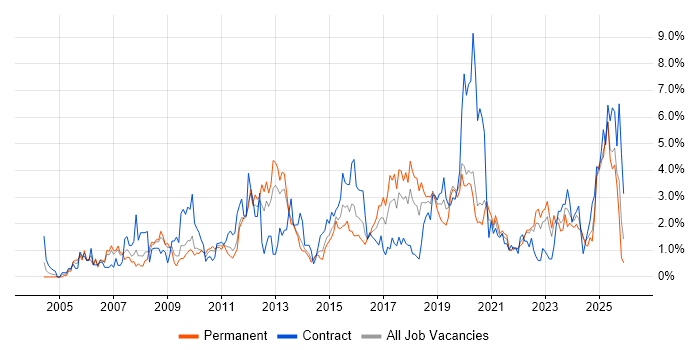Enterprise Resource Planning (ERP)
Merseyside > Liverpool
The table below provides summary statistics for permanent job vacancies advertised in Liverpool requiring ERP skills. It includes a benchmarking guide to the annual salaries offered in vacancies that cited ERP over the 6 months leading up to 31 May 2025, comparing them to the same period in the previous two years.
| 6 months to 31 May 2025 |
Same period 2024 | Same period 2023 | |
|---|---|---|---|
| Rank | 24 | 59 | 80 |
| Rank change year-on-year | +35 | +21 | +6 |
| Permanent jobs citing ERP | 18 | 29 | 16 |
| As % of all permanent jobs advertised in Liverpool | 6.64% | 2.57% | 1.79% |
| As % of the Processes & Methodologies category | 6.87% | 3.21% | 1.92% |
| Number of salaries quoted | 13 | 25 | 15 |
| 10th Percentile | - | £49,500 | £33,250 |
| 25th Percentile | £25,750 | £51,750 | £40,000 |
| Median annual salary (50th Percentile) | £26,500 | £60,000 | £55,000 |
| Median % change year-on-year | -55.83% | +9.09% | +22.22% |
| 75th Percentile | £27,250 | £72,500 | £59,150 |
| 90th Percentile | £55,750 | £78,000 | £60,859 |
| Merseyside median annual salary | £26,500 | £60,000 | £55,000 |
| % change year-on-year | -55.83% | +9.09% | +22.22% |
All Process and Methodology Skills
Liverpool
ERP falls under the Processes and Methodologies category. For comparison with the information above, the following table provides summary statistics for all permanent job vacancies requiring process or methodology skills in Liverpool.
| Permanent vacancies with a requirement for process or methodology skills | 262 | 903 | 832 |
| As % of all permanent jobs advertised in Liverpool | 96.68% | 80.12% | 93.06% |
| Number of salaries quoted | 151 | 606 | 352 |
| 10th Percentile | £30,000 | £28,250 | £28,750 |
| 25th Percentile | £35,000 | £36,250 | £37,500 |
| Median annual salary (50th Percentile) | £49,000 | £47,250 | £47,500 |
| Median % change year-on-year | +3.70% | -0.53% | - |
| 75th Percentile | £67,500 | £63,750 | £60,000 |
| 90th Percentile | £80,000 | £85,000 | £70,000 |
| Merseyside median annual salary | £46,000 | £45,000 | £45,750 |
| % change year-on-year | +2.22% | -1.64% | -3.68% |
ERP
Job Vacancy Trend in Liverpool
Job postings citing ERP as a proportion of all IT jobs advertised in Liverpool.

ERP
Salary Trend in Liverpool
3-month moving average salary quoted in jobs citing ERP in Liverpool.
ERP
Salary Histogram in Liverpool
Salary distribution for jobs citing ERP in Liverpool over the 6 months to 31 May 2025.
ERP
Co-occurring Skills and Capabilities in Liverpool by Category
The follow tables expand on the table above by listing co-occurrences grouped by category. The same employment type, locality and period is covered with up to 20 co-occurrences shown in each of the following categories:
